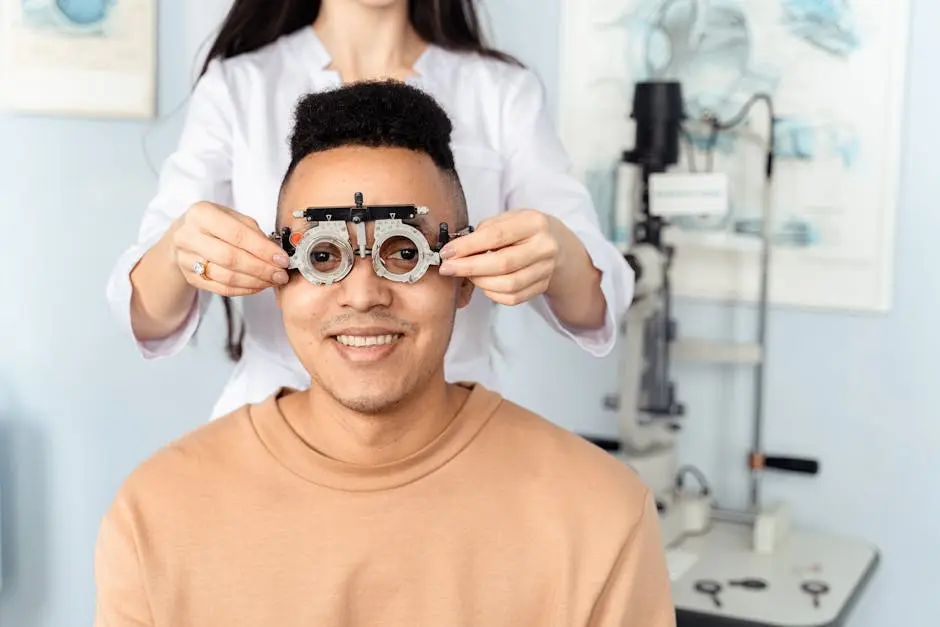
Visiting an optometrist for a vision test is essential for maintaining eye health. However, knowing the right questions to ask can greatly enhance your understanding and care. Here’s a list of things to discuss during your appointment to ensure you’re fully informed about your eye health.
1. Understanding Your Prescription
Ask your optometrist to explain your prescription. Understanding the numbers and symbols can help you make informed decisions about your eyewear.
It’s important to grasp how different lenses can influence your vision. For instance, knowing the difference between single vision, bifocals, and progressive lenses can guide you in choosing the right glasses that fit your lifestyle needs.
Don’t hesitate to ask for a detailed explanation about the sphere, cylinder, and axis measurements in your prescription. These numbers determine how your lenses will correct vision deficiencies. Plus, understanding the corrective power of your lenses will make renewing or adjusting prescriptions more straightforward in the future.
2. Exploring Vision Changes
If you’ve noticed any changes in your vision, be sure to discuss them. Understanding why these changes occur and how they can be managed is key to maintaining visual health.
Vision changes aren’t uncommon as we age, but they can also result from environmental factors, such as prolonged screen use or lighting conditions. Relay your experiences to your optometrist to see if similar issues were spotted during previous eye exams.
3. Eye Strain Solutions
Inquire about tips to alleviate eye strain, especially if you spend long hours in front of screens. Your optometrist might suggest specific exercises or products.
Consider asking about how the 20-20-20 rule, where you look at something 20 feet away for 20 seconds every 20 minutes, can help reduce eye strain. Also, inquire about specific computer glasses that could protect against the harmful effects of blue light.
Your optometrist might recommend modifications to your work environment, like adjusting monitor brightness or using anti-glare covers. Discussing these options can provide long-term relief from digital eye strain.
4. UV Protection Importance
Discuss the importance of UV protection for your eyes and the best options available. Proper protection is vital to preserving long-term eye health.
UV exposure can significantly affect your eyes, potentially leading to conditions like cataracts. Your optometrist can advise on effective UV-blocking sunglasses and discuss if photochromic lenses are an appropriate choice for you.
5. Contact Lens Considerations
If you’re considering contact lenses, ask about the best types for your eyes, how to care for them, and any potential risks involved.
Inquire whether daily, bi-weekly, or monthly lenses would be most suitable for your routine. It’s also worthwhile to ask about proper hygiene practices to prevent infections and complications associated with contacts.
6. Understanding Dry Eyes
Dry eyes are a common issue. Discuss potential causes and treatments with your optometrist to find effective relief solutions.
Lifestyle factors, such as diet and humidity levels at home, can contribute to dry eyes. Ask if changing your environment or introducing nutritional supplements like omega-3 fatty acids could alleviate symptoms.
7. Testing for Eye Diseases
Ask about tests for any potential eye diseases. Early detection is crucial, and regular eye exams can help identify issues before they progress.
Ensure that you discuss specific screenings for glaucoma, macular degeneration, or diabetic retinopathy if you are at risk. Routine tests like tonometry, dilated eye examinations, and optical coherence tomography can be instrumental in early detection.
8. Lifestyle Impacts on Vision
Discuss how your lifestyle might be affecting your vision and get personalized advice on adjustments or habits that could benefit your eyes.
Activities such as outdoor sports can be hard on your eyes, potentially leading to injuries or strain. Ask for recommendations on protective eyewear or lifestyle changes that could minimize vision risks.
9. Prescription Sunglasses
Consult your optometrist about prescription sunglasses. They can offer protection and improve vision clarity on sunny days.
Ask about the different types of lenses, like polarized or transition lenses, that can enhance your outdoor vision. Understanding which options provide the best harmful UV ray protection is essential.
10. Allergies and Eye Health
If you suffer from allergies, ask how they might affect your eyes and what treatments can help alleviate symptoms.
Some medications or indoor strategies, like using an air purifier, could alleviate allergic reactions manifesting in the eyes. Discussing these options during your appointment can yield effective strategies to reduce discomfort.
11. Eye Nutrition Advice
Nutrition can play a significant role in eye health. Ask your optometrist about dietary recommendations to support healthy vision.
Focus on asking about foods rich in vitamins C and E, zinc, and omega-3 fatty acids. These nutrients are known to reduce the risk of age-related eye conditions, like macular degeneration and cataracts.
12. Screen Time Effects
Discuss how excessive screen time might be impacting your eyes and get advice on how to mitigate negative effects.
Your optometrist might suggest the 20-20-20 rule and whether blue light filtering lenses could be beneficial. Also, ask about screen etiquette to reduce the strain from prolonged exposure.
13. Family Eye Health History
Providing information on your family’s eye health can help identify potential risks and allow your optometrist to recommend appropriate screenings.
Certain conditions, like glaucoma, might have genetic predispositions. Discussing your family history enables personalized advice and targeted monitoring based on specific hereditary risks.
14. Sports Eyewear Options
If you participate in sports, inquire about eyewear options that can protect your eyes while enhancing performance.
For activities like cycling or skiing, specialized lenses or protective goggles can enhance visibility and safety. Consult about different impact resistance features or lens coatings that might improve your sports vision.
15. Future Vision Concerns
Finally, ask your optometrist about any concerns you should be aware of regarding your vision in the future and what proactive measures you can take now.
Discuss potential age-related vision changes or risk factors due to environmental exposure. Your optometrist might suggest regular check-ups to monitor your eye health or early intervention techniques to mitigate any issues that could arise later.

